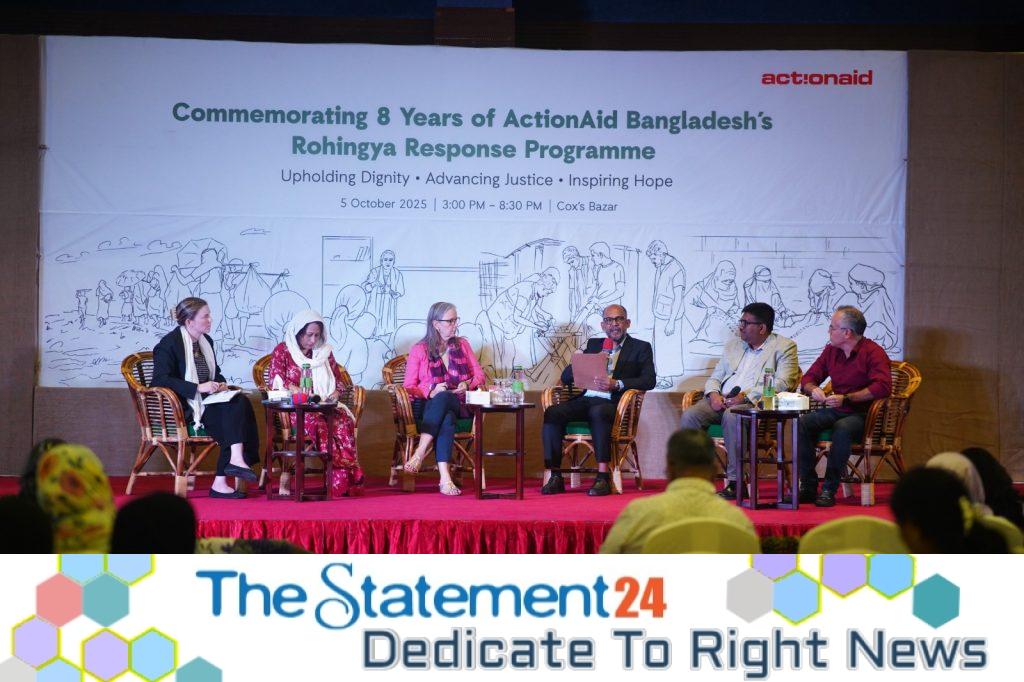
“There is no hope for resolving Rohingya crisis until repatriation begins,” saidMohammed Mizanur Rahman (Additional Secretary), the Refugee Relief and Repatriation Commissioner (RRRC).He made the remark as the Chief Guest while speaking at an eventorganised by ActionAid Bangladesh commemorating itseighth year in Rohingya response programmeon Sunday at Coxs Bazar.
He said, “For the past eight years, the Government has been working tirelessly to resolve the Rohingya crisis. Over the past year, Chief Adviser Dr Muhammad Yunus has visited the camps twice, a three-day international conference has been organised, and most recently, the issue was discussed at the United Nations General Assembly.”
He further added, “We are witnessing many positive changes in the Rohingya camps through our ongoing activities. However, due to the decline in funding, the crisis has intensified. Unless dignified and safe repatriation begins, we do not see any sustainable solution to this crisis.”
The programme highlighted ActionAid Bangladesh’s initiatives over the past eight years to protect the rights and dignity of Rohingya refugees, its notable achievements, and discussions on identifying long-term and sustainable solutions. National and international organisations were also urged to work together.Representatives from the United Nations, international agencies, researchers, and rights activists attended the event.
Two panel discussions were held on “Humanitarian-Development-Peace Nexus Strategy” and “Promoting Multi-Sectoral and Integrated Approaches.”The panels included Md Shamsud Douza, Additional RRRC (Joint Secretary), RRRC, Cox’s Bazar; David Welin, Assistant Representative, Protection, UNHCR, Cox’s Bazar; Gabriella Virginia Natascia Zullino, Senior Protection Officer, UNHCR; David Bugden, Principal Coordinator, ISCG; Silja Rajander, Head of Cox’s Bazar Sub-Office, UN Women; Juan Carlos Martinez Bandera, Head of Programme Area Office, Cox’s Bazar, WFP; Shahariar Sadat, Deputy Executive Director, CPJ, BRAC University; and Jasmin Akter, award-winning coach from Bradford, UK, Rohingya Action North East.
The discussants emphasised that for a sustainable solution, greater investment in women and in building the skills of Rohingya refugees is crucial. They also stressed the need to engage communities more effectively in project planning and implementation, alongside strengthening coordination among NGOs.
ActionAid Bangladesh’s Country Director, Farah Kabir, said, “There can be no compromise when it comes to humanitarian assistance. The miserable lives of the Rohingya cannot be ignored. The injustice they have faced must never be forgotten by the world, and justice must be ensured. In addition, we need a comprehensive master plan for the Rohingya response, bringing together all sectors under one coordinated approach.”
As part of the programme, six individuals were recognised with the “Beacon of Hope Award” for their outstanding contribution to humanitarian support for Rohingya refugees in Cox’s Bazar. The awardees were Maung Solaiman Shah, Mohammed Idrish, Kazi Md. Shoeb Amran, Md. Azad Moral, Jesmin Prema and Ummay Hafsa.
Other highlights of the day included the screening of a documentary film on ActionAid’s eight years of work with Rohingya refugees, a stage play titled “Hotte Thamibo” (We Shall Not Stop) performed by refugees, and an exhibition “Camp Hope” replicating the conditions of Rohingya camps.
Abdul Alim, Head of Humanitarian Programme, ActionAid Bangladesh; Maruf Mohammad Shehab, Head of Innovation and Resource Mobilisation; Sukarna Abdullah, Co-Coordinator, NGO Platform, Cox’s Bazar; and Razia Sultana, Founder and Executive Director, RW Welfare Society, among others also were present at the event.

